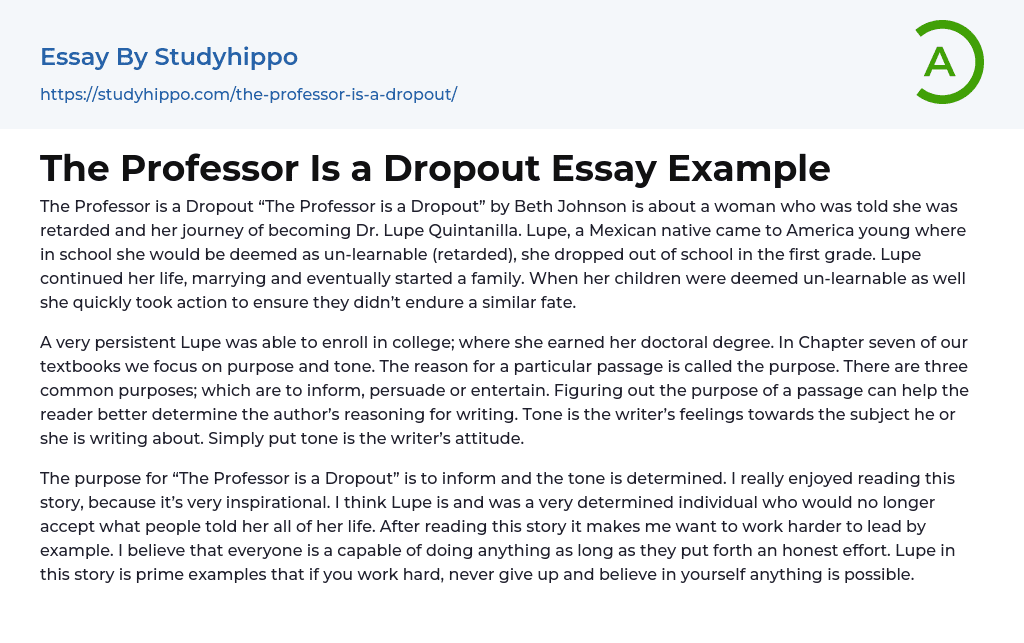The Professor is a Dropout “The Professor is a Dropout” by Beth Johnson is about a woman who was told she was retarded and her journey of becoming Dr. Lupe Quintanilla. Lupe, a Mexican native came to America young where in school she would be deemed as un-learnable (retarded), she dropped out of school in the first grade. Lupe continued her life, marrying and eventually started a family. When her children were deemed un-learnable as well she quickly took action to ensure they didn’t endure a similar fate.
A very persistent Lupe was able to enroll in college; where she earned her doctoral degree. In Chapter seven of our textbooks we focus on purpose and tone. The reason for a particular passage is called the purpose. There are three common purposes; which are to info
...rm, persuade or entertain. Figuring out the purpose of a passage can help the reader better determine the author’s reasoning for writing. Tone is the writer’s feelings towards the subject he or she is writing about. Simply put tone is the writer’s attitude.
The purpose for “The Professor is a Dropout” is to inform and the tone is determined. I really enjoyed reading this story, because it’s very inspirational. I think Lupe is and was a very determined individual who would no longer accept what people told her all of her life. After reading this story it makes me want to work harder to lead by example. I believe that everyone is a capable of doing anything as long as they put forth an honest effort. Lupe in this story is prime examples that if you work hard, never
give up and believe in yourself anything is possible.
- Christina Rossetti essays
- Emily Dickinson essays
- Ernest Hemingway essays
- Percy Bysshe Shelley essays
- Robert Browning essays
- Robert Louis Stevenson essays
- Seamus Heaney essays
- Carol ann duffy essays
- Anne Bradstreet essays
- Elizabeth Bishop essays
- Peter Skrzynecki essays
- Poets essays
- Robert Frost essays
- Aldous Huxley essays
- Anton Chekhov essays
- Charles Dickens essays
- Edgar Allan Poe essays
- F. Scott Fitzgerald essays
- Harper Lee essays
- Homer essays
- Jane Austen essays
- John Steinbeck essays
- Kurt Vonnegut essays
- Mark Twain essays
- Mary Shelley essays
- Nathaniel Hawthorne essays
- Sophocles essays
- Stephen King essays
- William Shakespeare essays
- Zora Neale Hurston essays
- Amy tan essays
- Virginia woolf essays
- Alice Walker essays
- Chinua Achebe essays
- Sherman Alexie essays
- George Orwell essays
- Sylvia Plath essays
- T. S. Eliot essays
- W. H. Auden essays
- Wilfred owen essays
- William blake essays
- Kate Chopin essays
- Oscar Wilde essays
- Phillis Wheatley essays
- Ray Bradbury essays
- Richard Rodriguez essays
- Walt Whitman essays
- The Tempest essays
- Leonardo Da Vinci essays
- Thomas Hardy essays




